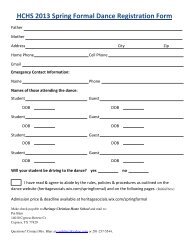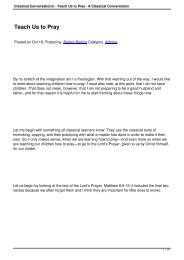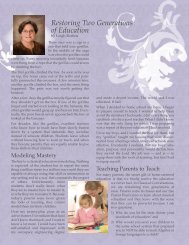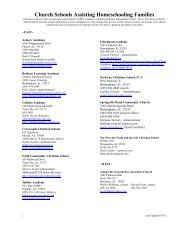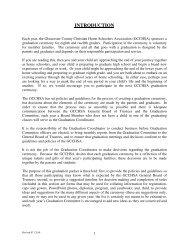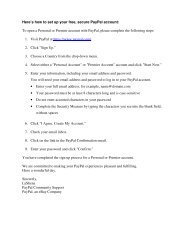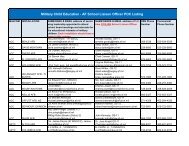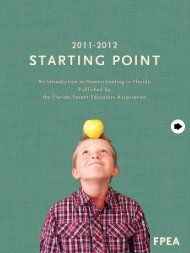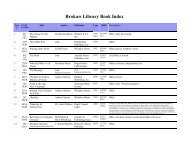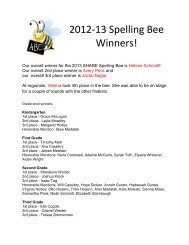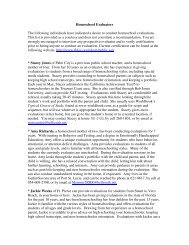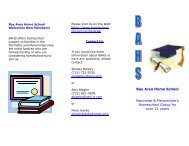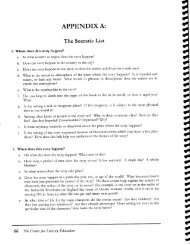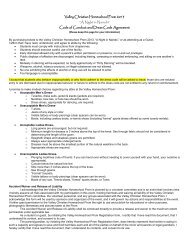Challenge FAQ - Homeschool-Life.com
Challenge FAQ - Homeschool-Life.com
Challenge FAQ - Homeschool-Life.com
Create successful ePaper yourself
Turn your PDF publications into a flip-book with our unique Google optimized e-Paper software.
<strong>Challenge</strong> Math Program <strong>FAQ</strong>s<br />
1. Why has Classical Conversations chosen to “standardize” their <strong>Challenge</strong>-level<br />
math track with the Saxon program<br />
a. It is a <strong>com</strong>plete K-12 Program<br />
b. Teaches math spirally, incrementally, systematically, and with repetition.<br />
c. Intentionally integrates with the subject of science and other practical applications “along<br />
the way”.<br />
d. Has been around for more than 25 years with proven results.<br />
e. Computer-based, DIVE CD’s available that aid in “extra” help for home school parents in<br />
introducing the Saxon Lesson. (Be sure your editions match☺)<br />
f. Teaching Tape Technology has created DVD’s that work through every practice problem<br />
and lesson problem for Saxon Math editions. website link view video sample link<br />
g. Listen to Leigh Bortins concerning the Saxon Math selection. link<br />
2. Where is the Geometry in the Saxon Math program<br />
Many universities require students to have a full year of informal geometry in order graduate. The<br />
Saxon math program has integrated geometry into their Algebra scopes. Therefore once student<br />
has <strong>com</strong>pleted Algebra 1 and 2 they have <strong>com</strong>pleted three credits.<br />
3. How do I record Saxon Math credits on my transcript<br />
Visit Saxon’s <strong>FAQ</strong> webpage.<br />
4. Do colleges view Saxon as an acceptable math curriculum<br />
Yes, Saxon textbooks are used by thousands of students in public and private schools nationwide.<br />
Many of these students have continued their educations at colleges and universities throughout<br />
the country. There have been no major problems with these institutions accepting Saxon’s math<br />
programs. Some have had questions regarding our integrated approach to geometry, but in every<br />
case we have successfully addressed the questions with a letter of explanation. – from Saxon<br />
<strong>FAQ</strong> page<br />
5. We do not use Saxon Math at home, why should I attend the <strong>Challenge</strong> Math/Logic<br />
Seminar<br />
Participating in the math seminar of a particular <strong>Challenge</strong> program is about the dialectic (logic)<br />
discussion or skill of math concepts as well as working through some of the math problems<br />
associated with that math concept. It is not about “getting through” a certain math book.<br />
While using the same text at home that is being used as the reference in the one hour math<br />
seminar is convenient, it is not necessary or required in order to benefit from the math seminar.<br />
CC <strong>Challenge</strong> tutors will work from CC’s core math program, which is Saxon. Parents may<br />
use the math curricula of choice at home and still benefit greatly from the dialectic discussion and<br />
logical thought process during the math seminar.<br />
Suggestion: Check with your tutor on the concepts covered using the Saxon Algebra reference<br />
and how it may correlate with your preferred math program at home. There will be similarities that<br />
may easily coincide in schedule between the two programs.
Classical Conversations recognizes that the selection of a solid math curriculum is an intimidating task for many home school parents.<br />
As home school parents our greatest desire is to “do things right”, but we must be careful to not make decisions based on ignorance,<br />
fear, or the latest “fad”. A few of CC’s leadership team members were engineers by training, and they find the math included in Saxon<br />
solid and excellent. Your math curricula choice will be based on your own views of math and past experiences with math. Remember<br />
there is no “perfect” math curriculum; upper-level math will require hard work no matter what math curricula you end up choosing.<br />
May the Lord grant you wisdom!<br />
Comments from Leigh Bortins regarding Saxon and the Math/Logic Seminar…<br />
Saxon math texts are popular among home school families because their incremental explanations and<br />
practice sets allow most parents and students to teach themselves Algebra. Classical Conversations uses<br />
Saxon's most recent edition texts. Most students can not learn Algebra in a class setting in only an hour a<br />
week. To excel, they must work daily at good study habits and <strong>com</strong>pleting the problem sets while a parent<br />
at home keeps up with their work. By following the math of their eldest child, most parents can relearn<br />
while their child learns and then they will have a much easier time teaching math with subsequent<br />
children. Home schooling is work for the parent as well as the child. If you couldn't read, you would need<br />
to learn how to read in order to teach your child. The same idea applies to math. It is currently<br />
fashionable to be innumerate in America. Being innumerate is as dangerous as being illiterate in our<br />
culture. Christians especially have no excuse to give up on the language of God's Creation (mathematics).<br />
Please, pray not to pass this attitude on to your children.<br />
The goals of the Algebra seminar are to explain the new lessons for the week, go over any previous<br />
difficulties students have had, and provide a chance to discuss math with other students. At the<br />
beginning of each seminar, students need to tell the tutor which problems are challenging them, otherwise<br />
the tutor can't help. When the student's questions are resolved, the tutor will move on to explaining the<br />
next four lessons assigned for the up<strong>com</strong>ing week. The class will study the practice problems together,<br />
working at the board so both the tutor and students can see how they approach the problem. Quite often<br />
one student will clarify a problem another student has.<br />
Algebra students must work on good study habits. Students who have always been good at math start to<br />
have difficulty at this point for two reasons. First, they are often used to doing math in their head.<br />
When they encounter multi-step problems, they may lose track of the steps if they do not write them<br />
down. Second, the number of steps increases opportunities for careless errors. To help over<strong>com</strong>e these<br />
problems, insist that problems with more than one step be written down. Also, insist that only a few<br />
problems be <strong>com</strong>pleted per page. Many students attempt to do 25 problems on the front of one sheet of<br />
paper. This leads to a lot of small numbers per page, which are difficult to check quickly. We suggest<br />
dividing a page into four sections for four problems. It may seem like a lot of wasted space now, but it is<br />
a habit that will pay off as the number of steps increase in higher math.<br />
Saxon has done a great job of hand-holding through the Algebra I text. In the later texts, Saxon<br />
expects the student to be able to look up previously taught information and to study the steps presented.<br />
They also make the assumption that students understand basic algebraic principles and do not always show<br />
every detail when solving a problem. Learning to study well in Algebra 1/2 and Algebra I will greatly<br />
improve the odds for success in Algebra II and beyond.<br />
- excerpt from <strong>Challenge</strong> I Guide (pps 11, 12)
Sequential History and Classical Conversations<br />
“The glory of God is to conceal a matter; the honor of kings is to search out a matter.”<br />
Proverbs 25:2<br />
A number of people have recently asked me, “Where is the classical history” What I suspect<br />
they mean is “Where is the history sequence promoted by ‘traditional’ classical schools”<br />
Dorothy Sayers in her essay, “The Tools of Learning,” never even mentions a historical<br />
sequence to studies. Now, a sequential focus is a very good idea, but it is not a necessary idea<br />
for classical studies.<br />
The whole point of classical studies is to give students the tools needed to jump in anywhere in<br />
any subject, discover the foundational grammar, and proceed to teach themselves the subject –<br />
hopefully with a good mentor nearby to help with difficulties.<br />
Because Classical Conversations works with home schooling families with various abilities to<br />
teach at home, we have developed our curriculum differently than formal classical schools<br />
where there is a Master for each subject or public institutions that do not even offer such<br />
academically challenging programs of physics and Latin. With this in mind, our considerations<br />
are very different.<br />
So where is our classical history<br />
In Foundations, it includes memorizing a 203-point timeline, adding interesting sentences that<br />
flesh out some of the timeline points, reading great literature at home and writing about the<br />
units we are studying. If a parent follows our curriculum guide and purchases even a few of our<br />
suggested materials, they will have an excellent, sequential history program at home with their<br />
children having the fun of be<strong>com</strong>ing Memory Masters. My oldest son, whom I did not teach<br />
classically in his early years and therefore did not receive a strong grammar of history, is<br />
studying Western Civilization in college this semester. He came home at spring break and was<br />
participating in our history lesson for the week. He said, “Mom, this is just what I’m supposed<br />
to know for my class. How <strong>com</strong>e you didn’t teach me this stuff” I did not understand the<br />
value of memorization when my first two boys were home schooled. Now they are paying the<br />
price for the lack of a grammar level classical education and my little boys are reaping the<br />
rewards of a classical education from the start.<br />
In <strong>Challenge</strong> A and B, we take a very different approach to middle school or junior high. This<br />
age student is still a child and yet is able to think reasonably and logically. They can think<br />
abstractly and so need to begin honing the dialectic skills. Unfortunately, too many of them<br />
<strong>com</strong>e to us with a need for stronger grammar skills (as my son mentioned above). So, we<br />
continue to have a lot of grammar in the curriculum like English and Latin and geography, but<br />
we also mix in Christian worldview discussions, essays, and presentation skills to get them<br />
thinking. The students read and discuss a lot of history that is especially effective if the student<br />
has a timeline memorized. If they do not have a timeline in their head, our historical fiction and<br />
biblical discussions remain excellent literature studies but not integrated classical studies for<br />
those students. For example, in <strong>Challenge</strong> A literature, students read, discuss, and present<br />
papers about ancient myths, ancient Jerusalem, the middle ages, colonial America, New<br />
England slavery, Victorian England, and World War II. They also have opportunities to write<br />
about and discuss modern science and have an intensive geography course. Parents need to<br />
effectively use the opportunities we give them to practice their grammatical, dialectic, and
hetorical skills. A student with a timeline and world map memorized will benefit far more from<br />
these historical novels than a student without these skills who has only been exposed to good<br />
history books. The good books have nowhere to “fit” in a child’s mind without a time line and<br />
map. Now, we do work on memorizing the world in <strong>Challenge</strong> A so all the students have an<br />
opportunity to catch up on their geography grammar. Parents, who have not previously<br />
focused on giving their child strong grammar-level studies, should have them memorize a<br />
timeline to use throughout junior and senior high. We suggest the one we use in Foundations,<br />
The Veritas Press History Cards. If a little child can memorize them in a 24-week period,<br />
certainly an older child could do it over a summer. The difficulty to over<strong>com</strong>e is that most older<br />
children will find it a chore rather than a fun challenge.<br />
In <strong>Challenge</strong> B, students read, discuss, and present papers about colonial America, early 20 th<br />
Century Florida, the Ozarks, and modern America, with a little bit about World War II. Instead<br />
of geography, they focus on current world events and the American justice system through<br />
Mock Trial. The focus is away from grammar and towards thinking things through. Both<br />
<strong>Challenge</strong>s A and B emphasize numerous writing opportunities because students need to learn<br />
to write well to succeed in the higher <strong>Challenge</strong>s.<br />
In high school, we totally ignore the sequence most classical schools use. I would love it if the<br />
average home schooling parent of a ninth grader could instill a love for The Iliad in its poetic,<br />
unabridged form and convict their child of the importance of entering the great conversations<br />
of western civilization. Unfortunately, few parents have had success with this in their home<br />
school. However, they may love Mark Twain or at least may be familiar with Melville. Thus, we<br />
reverse the chronology and start with American studies in <strong>Challenge</strong> I, European studies in<br />
<strong>Challenge</strong> II, tackle American studies again in <strong>Challenge</strong> IIII, and World studies in <strong>Challenge</strong> IV.<br />
By <strong>Challenge</strong> IV, we can help a student enjoy the search for life’s big ideas because if they stay<br />
in our program that long, they tend be secure, self-motivated young adults. So we begin our<br />
rhetorical skill building where families are most <strong>com</strong>fortable and proceed to more difficult, less<br />
familiar material as the students mature.<br />
In <strong>Challenge</strong> I, they study American Literature, American Government, and Free Market<br />
Economics. The actual assignments provide a great course in American history. And they<br />
spend a lot of time on current events through Debate. But again, without a timeline and map in<br />
the student’s head these courses are disconnected subjects to the student.<br />
In <strong>Challenge</strong> II, they study British Literature and Western Cultural History. From Beowulf to CS<br />
Lewis, from Roman architecture to modern Christian responses to music and art, the students<br />
have over 30 writing assignments, debates, and presentations related to European history and<br />
Western Civilization.<br />
In <strong>Challenge</strong> III, students study an American History text, Macbeth, Henry V, Hamlet (all three<br />
English history), Julius Caesar (Roman history), and the historical consequences of the ideas of<br />
philosophers from Plato to Freud. They, too, have over 30 assignments related to history this<br />
year. Again, we have plenty of opportunities to study history integrated with many other<br />
subjects but it takes a timeline, a map, and a heart searching for big ideas to get the most out of<br />
these courses.<br />
In <strong>Challenge</strong> IV, we integrate studies using “The Discoverers” (a history of science), three major<br />
theologians, and a study of ancient literature and the questions the literature raises for modern<br />
Christians. Students in these seminars use the materials assigned and more materials that they<br />
choose on their own to present multiple theses on the relationship between science, literature,<br />
and theology throughout history.
So, if you are looking for a chronological history course in our <strong>Challenge</strong> program, you will not<br />
find it. If you are looking for a focus on the practice of writing and discussing and presenting<br />
historical information and history’s effect on the rest of the subjects God created, our program<br />
is perfect for you. We know you need to have a good history sequence in your head in order to<br />
think logically and present information effectively at the dialectic and rhetorical levels. That is<br />
why it is so important to teach your young students to memorize maps and a timeline.<br />
In summary, Classical Conversations programs emphasize the tools of learning – grammar,<br />
dialectic (logic), and rhetorical skills. We focus on grammar in the Foundations and Essentials<br />
programs and in various seminars in the <strong>Challenge</strong> program such as foreign language. We focus<br />
on the dialectic skills in Essentials and <strong>Challenge</strong>, and on the rhetorical skills in <strong>Challenge</strong>s II-IV.<br />
We do not focus on subject matter during <strong>Challenge</strong> seminars, though it is a very important<br />
part of our curriculum. Parents need to do that at home. During our one day a week tutorials,<br />
we demonstrate the tools of learning, answer difficulties, and encourage parents and students<br />
to apply those tools in their personal studies. Those students entering our <strong>Challenge</strong> programs<br />
without a solid classical grammar school education will need to put in the extra grammar work<br />
in order to get the most from our <strong>Challenge</strong> programs.<br />
Leigh Bortins<br />
Classical Conversations<br />
Founder and CEO<br />
Revised 1/21/2009



